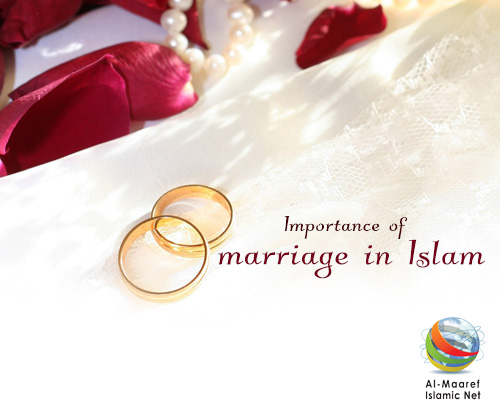The Most High Allah says in His Glorious Book, {Men are the protectors and
the maintainers of women because Allah has made one of them to excel the other,
and because they spend from their means…}1 This noble Aya is
considered the base which The Most High Allah presents for the division of the
roles between the man and the woman in their marital life, thus making the
husband the superintendent over the family.
The Reasons of Man’s Superintendence
The above mentioned Aya mentions two major reasons for the man’s
superintendence in the family; these two reasons are the following:
1- Preference
The Most High Allah says, {…because Allah has made one of them to
excel the other…} The Most High Allah preferred one to the other i.e. the
man to the woman. What is meant by preference in this aya? In order to answer
this question, it is indispensable to mention that preference has two
connotations.
The first connotation is the constitutional preference. Here, the preference has
to do with the body and what is related to it i.e. the man is physically
stronger, so he can protect the family and he can get into the fields of life in
order to work to earn the living for the family; and he is stronger in making
reason dominate the emotion, so he is more capable of taking the decisions.
The second connotation is the honorable preference. It is meant here the
preference in honor and closeness to The Most High Allah exactly as The Most
High Allah preferred the human being to all the other creatures by granting him
reason and as He preferred the fighters for Allah’s sake to those remaining at
home by granting them a great reward.
Then, which aspect of preference is meant by the noble aya?
The preference meant in the noble aya is not the second one i.e. not the
honorable preference, definitely not. Because of this, The Most High Allah says,
{O mankind! We have created you from a male and a female, and made you into
nations and tribes, that you may know one another. Verily, the most honorable of
you with Allah is the most pious…}2 Besides, the evaluation of
the deeds on the Day of Judgment is going to be based on the individual conduct
and not on the gender of the performer of the deed; The Most High Allah says,
{Whoever works righteousness, whether male or female, while he (or she) is a
true believer (of Islamic monotheism) verily, to him We will give a good life
(in this life with respect, contentment, and lawful provision)… }3
What is actually meant in the noble aya is the constitutional preference i.e.
Allah put certain factors in the man which are in harmony with his being the
manager. It is indispensable that the family includes management which can be
either to the man or to the woman or it can be shared between them.
Suppose that the management is in the hands of the woman, this will not be
suitable because the characteristics of the man are the best for management from
the constitutional view. Suppose that it is shared between them, this will not
work because in case they do not agree on a certain issue, whose is the license
to decide? It is indispensable to have a final decision and that each mate knows
that the final decision is to this one or to that one, so that things will not
remain suspended. Partnership implies congruence, cooperation, consultation, and
constructing everything on harmony. But suppose that this gets out of balance
somewhere, then there must be a leadership and a final decision. Therefore, all
analyses lead to the conclusion that there must be management, and this
management must be to the man.
Why did not Allah make the woman like the man?
Some people wander that since The Most High Allah created the man with certain
qualifications presenting him as being more capable of management than the woman
is and that since The Most High Allah is Capable of everything, why did not He
create the woman with the same qualifications He created the man with?
In answering this question, we say that this is not in harmony with the
populating of the uniAya with the mankind and with the distinguishing which The
Most High Allah founded in the creatures even as regards men themselves and
women themselves: {…so that some may employ others in their work…}4
i.e. so that there will be an employment of the different capabilities, so
that each one will help the other one and so that the social life will go on.
This is so because as the social life requires a physical strength in the man,
it requires a strong emotion in the woman who is the source of the spiritual
nutrition of the baby even though this emotion may sometimes lead to dominating
the reason.
This point, therefore, is not about the marital life only; it has to do with all
the mankind, men and women.
2- Expense
The Most High Allah says, {…and because they spend from their
means…} There is a concomitant between the responsibility and the authority:
We can not make someone carry a certain responsibility without giving him
authority.
Modern Science of Administration has stated that there must be a concomitance
between the responsibility and the authority: So that the one assigned with a
certain role will be able to carry it out, he must be given adequate authorities
by means of which he can bring out his work into success.
Henceforth, The Most High Allah says, {…and because they spend from their
means…} In return for the effort exerted by the man for the sake of the
family, it is indispensable that he be granted the authority to dispose of his
money as he finds it to be fit and it is indispensable that there be an
equivalence between the effort he exerted and the result he wants to get.
1- Mention the aya which refers to the matter of the superintendence in the
family.
2- What is the first reason for man’s superintendence over the woman?
3- How is the issue of superintendence approached from the point of the
dutifulness of expense?
4- What is the best system for the family to which The Noblest Prophet (Allah’s
prayers and peace bestowed upon him and his Household) guided us?
5- What are the environments that must be governing the martial relationship?
1- The Noble
Qur’an/ Al-Nisaa [The Women] Surah/ Aya 34
2- The Noble Qur’an/ Al-Hujurat [The Chambers] Surah/ Aya 14
3- The Noble Qur’an/ Al-Nahl [The Bees] Surah/ Aya 97
4- The Noble Qur’an/ Al-Zukhruf [The Gold Adornments] Surah/ Aya 32




















